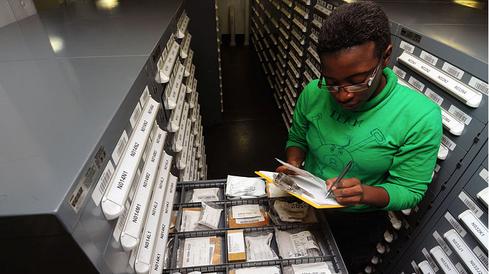Military Supply Data Search Tool Uses MongoDBMilitary Supply Data Search Tool Uses MongoDB
Niinja search engine from startup Vital Axiom taps into MongoDB to simplify searches of vast catalogue of products and parts purchased by the government.


10 Cool DARPA Projects In Development
10 Cool DARPA Projects In Development (click image for larger view)
The Department of Defense purchases nearly 7 million types of products and does business with 2.7 million supplier companies, according to government records. Knowing what products and parts are stocked in DoD warehouses worldwide is not only a challenge for military logistics personnel, but also for suppliers who need information on products the DoD keeps in stock.
Although information about stocked products is publicly available in the Federal Logistics Information System (FLIS), the scale of the data makes FLIS difficult to search and navigate without specialized logistics training.
A Chicago-based technology startup, Vital Axiom, believes it has developed a better approach with the launch of a new search product called Niinja. The specialty search engine was built specifically for FLIS and makes data on military supplies easier to search, use, and understand with graphs, maps, and tooltips for decoding military abbreviations, says Vital Axiom's founder, Kabir Mehta.
The DoD publishes FLIS data in zip, text, and doc files on a website managed by the Defense Logistics Agency's (DLA) cataloging staff. The information is updated monthly in an electronic reading room on the website. The files, however, are large and cumbersome to use. The most common way vendors can access FLIS data is through a DLA website called WebFLIS, which requires the user to know what she is looking for, said Mehta.
[Keeping track of parts is just one of the database challenges the military faces. Read: The War On Military Records.]
Alternatively, vendors can subscribe to a monthly government service that publishes the FLIS data on a DVD and mails it to users who pay the $200 yearly subscription. That's twice the cost of Niinja, which is $99 a year, according to Mehta.
Niinja lets users perform a search in one text box and returns results in a ranked list that is sorted by relevance. Mehta explained that the process is far less complicated than using WebFLIS.
Niinja uses MongoDB, a database that supports Web-scale applications that use large sets of data. MongoDB can make multiple data searches simultaneously, for instance. Niinja also makes it easier to identify monthly database updates. As a result, Niinja is able to track all data changes for the past 12 months. This type of historical search is not available in any government-provided FLIS, Mehta said.
The technology has the ability "to search the vast datasets much more efficiently than interfaces created by DLA," said Mehta in an interview. "With the recent cuts in federal budget, and DLA's goal to save $13 billion over the next six years, it is clear to us that innovation in government technology has to come from private software developers."
The current system used by the Army is seen as archaic, said Zachary Harrison, a market research manager at Bearing Analytics, who also served 10 years in the military and has extensive experience in military logistics. An Army supply clerk's time is often spent on Google, researching what and where to buy something.
"There are many sources and various channels that can be used, but there exists no centralized location to compare prices and look at the physical location of these products," Harrison told us.
Niinja removes the research aspect, which is the most time consuming, and serves up the least expensive options available. For a commander at the company level, this makes it easier to budget allotted resources. The search engine's download option is its most valuable aspect, Harrison said. The supply codes and product information are all available in an Excel document and do not require individual data input.
Mehta said it's unclear whether the government will allocate resources to improve FLIS access beyond its Freedom of Information Act (FOIA) e-reading room with raw data files, which is why Vital Axiom is planning to provide an API for Niinja in the second quarter of 2014. Anyone with access to the API will be able to build mobile apps, business apps, and customized reports on FLIS data with Niinja as a backend.
Elena Malykhina has written for The Wall Street Journal, Scientific American, Adweek, and Newsday. She covers the federal government, including NASA's space missions, for information.
Too many companies treat digital and mobile strategies as pet projects. Here are four ideas to shake up your company. Also in the Digital Disruption issue of information: Six enduring truths about selecting enterprise software. (Free registration required.)
About the Author
You May Also Like






